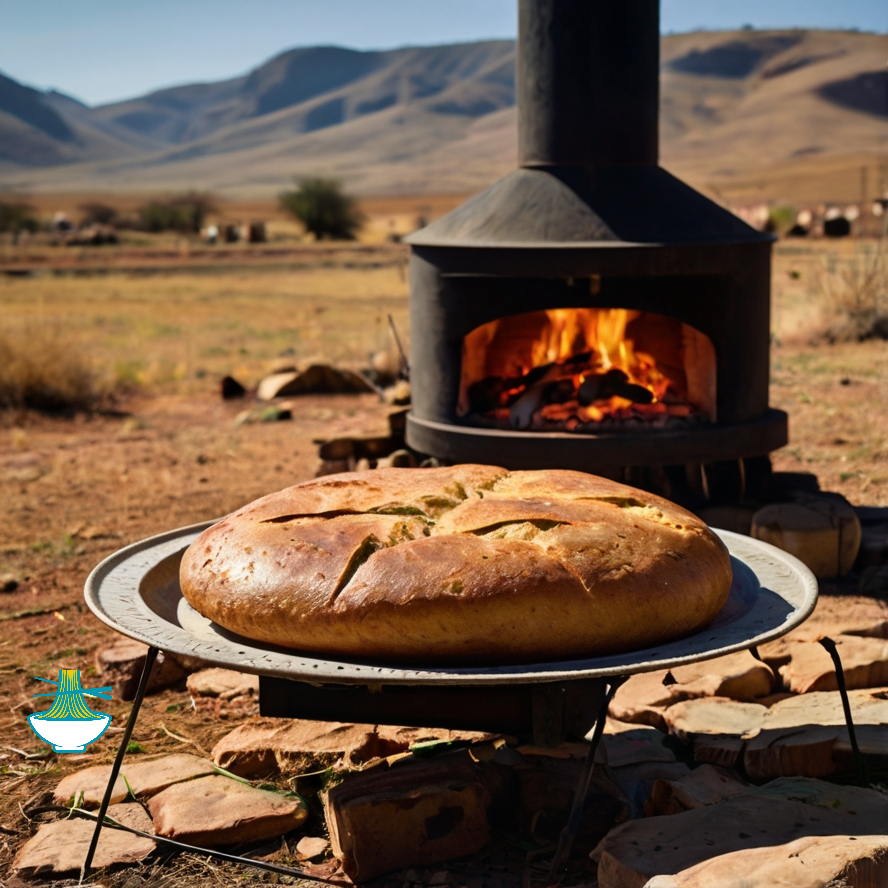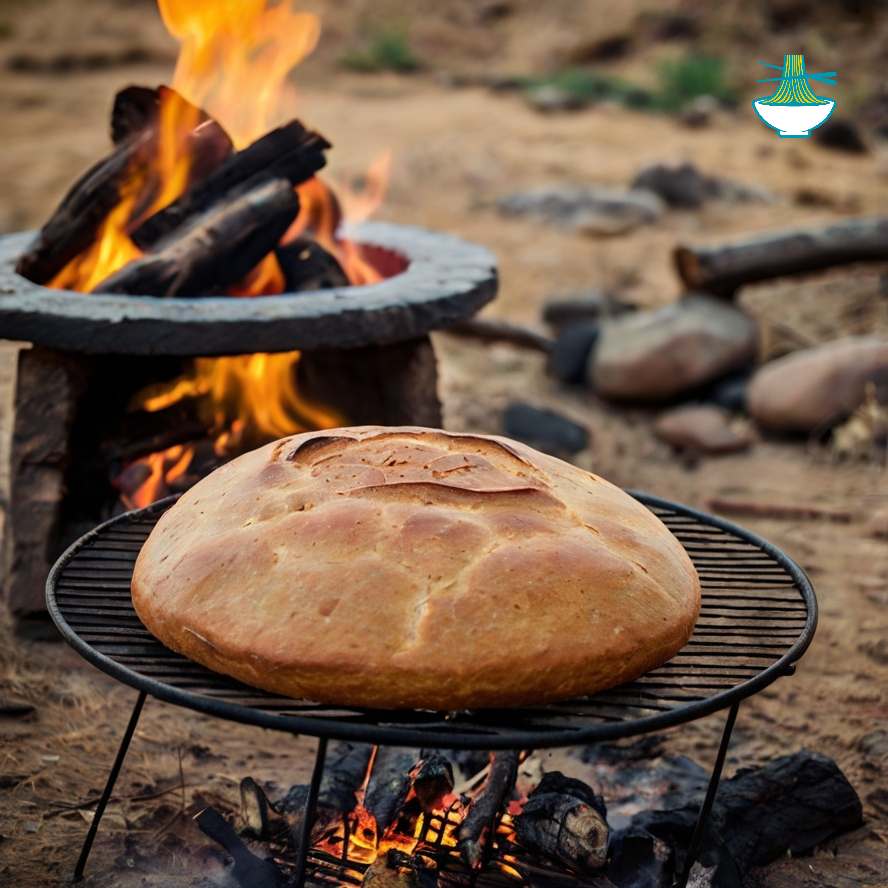Maqebekoane is a traditional bread from Lesotho, made from wheat flour or maize flour and baked in a pot over an open fire. This unique preparation method not only adds a distinct smoky flavor but also offers a deep connection to the cultural heritage of Lesotho. The bread is a rich source of carbohydrates, providing energy for daily activities. It also contains fiber, which aids in digestion and promotes gut health. The maize flour used in Maqebekoane is an excellent source of iron, helping in the production of red blood cells, and calcium, which supports bone health. While the bread provides healthy fats when made with vegetable oil or butter, it’s important to consume it in moderation due to its calorie and fat content. Overall, Maqebekoane is a delicious and nutritious bread that brings a taste of tradition and offers essential vitamins and minerals for a balanced diet.
Ingredients:
- 2 cups maize flour (or wheat flour if preferred)
- 1 teaspoon baking powder
- 1/2 teaspoon salt
- 1 tablespoon sugar (optional)
- 1 cup warm water (adjust as needed)
- 1-2 tablespoons vegetable oil (or butter)
Healthier Alternatives to Butter and Oil:
If you're looking for healthier alternatives to butter or vegetable oil when making Maqebekoane, consider these options:
- Olive Oil: Olive oil is a heart-healthy option, rich in monounsaturated fats that support cardiovascular health. It can be used in place of vegetable oil or butter for a lighter version of the bread.
- Coconut Oil: Coconut oil is another alternative, known for its distinct flavor and healthy fats. While higher in saturated fat than olive oil, it can still be used in moderation for a unique twist on the traditional recipe.
- Avocado Oil: A great option for those looking to boost the bread’s nutritional content, avocado oil is high in healthy fats and antioxidants.
Instructions:
Prepare the dough:
- In a large mixing bowl, combine the maize or wheat flour, baking powder, salt, and sugar (if using).
- Gradually add warm water and stir until a soft dough forms. Add more water if necessary, but the dough should not be too sticky.
- Knead the dough for 5-7 minutes until smooth. If using oil or butter, knead it into the dough for a softer texture.
Shape the bread:
- Divide the dough into small portions and shape each into a round or oval flat loaf, about 1 to 1.5 inches thick.
Prepare the cooking pot:
- If you're using a traditional method, prepare a pot or cast-iron Dutch oven. It should be large enough to hold your bread comfortably. Light a fire, and once it’s steady, place the pot over the embers or on a grill.
Cook the bread:
- Heat the pot for about 5 minutes before placing the dough inside.
- Place the bread in the pot, cover with a lid, and bake over the fire for about 30-40 minutes, checking occasionally. You may need to adjust the heat by moving the pot around the fire.
- Flip the bread halfway through to ensure it cooks evenly.
Check for doneness:
- The bread is done when it sounds hollow when tapped on the bottom and has a golden-brown crust. If using a toothpick, it should come out clean when inserted into the center.
Serve:
- Allow the Maqebekoane to cool slightly before slicing and serving. Enjoy with butter, jam, or your favorite dish!
This recipe is a great way to experience the traditional flavors of Lesotho while making use of simple ingredients and rustic cooking methods.
Examples of How to Serve Maqebekoane:
Maqebekoane, with its rustic flavor and unique texture, can be served in a variety of ways. Here are a few ideas for pairing it with other foods:
- Jam or Butter: Spread butter or your favorite jam (such as strawberry, apricot, or marmalade) on the bread for a sweet and savory combination.
- Traditional Soup: Enjoy Maqebekoane with a bowl of hearty vegetable or meat-based soup. The bread’s texture and flavor complement the richness of the soup, creating a fulfilling meal.
- Grilled Vegetables: Pair it with grilled vegetables like corn, bell peppers, or eggplant for a balanced, savory meal.
- Cheese: Maqebekoane also pairs wonderfully with cheese, particularly soft cheeses like cream cheese or feta, for a rich, comforting dish.
Note:
The Impact of Cooking Over Open Flame on the Flavor of Maqebekoane:
- Baking Maqebekoane over an open fire imparts a distinctive smoky flavor to the bread, which is a hallmark of traditional cooking in Lesotho. The fire’s heat ensures that the bread has a crisp, golden-brown crust, while the inside remains soft and moist. The open flame also creates a slight char on the bread’s surface, which adds depth to the flavor profile. This cooking method contributes to the bread’s unique taste and texture, which cannot be easily replicated using modern ovens.
Frequently Asked Questions (FAQs) Answered:
- Can I use alternative ingredients in this bread? Yes, you can substitute maize flour with wheat flour if you prefer or if you are unable to find maize flour. However, this may slightly alter the texture and taste of the bread. Additionally, you can replace the sugar with natural sweeteners like honey or maple syrup for a healthier alternative. If you have gluten sensitivities, you could also try using gluten-free flours such as rice flour or sorghum flour.
- How should I store Maqebekoane? To keep Maqebekoane fresh, store it in a cool, dry place in an airtight container or bag. This will help maintain its softness for a few days. If you want to store it for a longer period, you can freeze the bread. Just make sure to wrap it tightly in plastic wrap or foil before placing it in a freezer bag.
- Can I make Maqebekoane in an electric oven? Yes, if you don't have access to an open flame, you can bake Maqebekoane in a regular oven. Preheat the oven to around 350°F (175°C) and bake the bread for 25-30 minutes or until the crust is golden brown and the bread sounds hollow when tapped on the bottom. Make sure to check the bread occasionally and adjust the time based on your oven’s heating.
- What are the health benefits of Maqebekoane? Maqebekoane provides several health benefits due to its nutritional content. The maize flour used in the bread is rich in fiber, which helps in digestion and promotes a healthy gut. Additionally, the bread contains iron, which is important for red blood cell production, and calcium, which supports bone health. The fats from the oil or butter contribute to healthy cell function, although it is best to consume the bread in moderation due to its calorie content.
- Can I make this bread vegan? Yes, Maqebekoane can easily be made vegan by using plant-based oils instead of butter. Olive oil, coconut oil, or avocado oil are excellent choices for maintaining the bread’s texture and flavor without using animal products. Additionally, you can skip the optional sugar or replace it with a plant-based sweetener like maple syrup.

Nutritional Values and Benefits:
Maize Flour (2 cups)
Nutritional Value (per 1 cup):
- Calories: 440 kcal
- Carbohydrates: 92 g
- Protein: 8 g
- Fat: 2 g
- Fiber: 6 g
- Iron: 2.3 mg
- Calcium: 2 mg
Benefits:
- High in Carbohydrates: Provides a significant energy source.
- Rich in Fiber: Supports digestion and helps maintain bowel regularity.
- Gluten-Free: Ideal for individuals with gluten sensitivities or celiac disease.
- Rich in Iron: Supports red blood cell production and helps prevent anemia.
2. Baking Powder (1 teaspoon)
Nutritional Value (per teaspoon):
- Calories: 1 kcal
- Sodium: 498 mg
- Carbohydrates: 0.5 g
Benefits:
- Leavening Agent: Helps the bread rise, resulting in a light and fluffy texture.
- Sodium Content: Helps activate other ingredients in the recipe.
3. Salt (1/2 teaspoon)
Nutritional Value (per 1/2 teaspoon):
- Sodium: 1160 mg
Calories: 0 kcal
Benefits:
- Essential Mineral: Helps maintain fluid balance, nerve function, and muscle contractions.
- Enhances Flavor: Adds seasoning to the bread, bringing out its natural flavors.
4. Sugar (1 tablespoon, optional)
Nutritional Value (per tablespoon):
- Calories: 48 kcal
- Carbohydrates: 12 g
- Sugars: 12 g
Benefits:
- Energy Boost: Provides quick energy due to the simple sugars.
- Flavor Enhancer: Adds slight sweetness, balancing the savory taste of the bread.
5. Warm Water (1 cup)
Nutritional Value:
- Calories: 0 kcal
- Sodium: 0 mg
- Carbohydrates: 0 g
- Protein: 0 g
Benefits:
- Hydration: Crucial for the dough to come together and activate the yeast (if used in variations).
- Helps in Kneading: Provides the necessary moisture for a smooth dough consistency.
6. Vegetable Oil (1-2 tablespoons)
Nutritional Value (per 1 tablespoon):
- Calories: 119 kcal
- Fat: 14 g
- Saturated Fat: 1 g
- Carbohydrates: 0 g
- Protein: 0 g
Benefits:
- Provides Healthy Fats: Contains unsaturated fats that can support heart health.
- Enhances Texture: Adds moisture to the bread, making it soft and tender.
Alternatively, Butter (1-2 tablespoons):
Nutritional Value (per 1 tablespoon):
- Calories: 102 kcal
- Fat: 12 g
- Saturated Fat: 7 g
- Carbohydrates: 0 g
- Protein: 0 g
- Cholesterol: 31 mg
Benefits:
- Rich Flavor: Adds richness and depth to the taste of the bread.
- Source of Vitamin A: Supports eye health and skin.
Summary of Nutritional Values for the Whole Recipe:
- Calories: ~600-650 kcal (for the entire recipe, depending on the oil/butter used)
- Carbohydrates: ~105 g
- Protein: ~8 g
- Fat: ~16-18 g (depending on oil or butter choice)
- Fiber: ~6 g
Nutritional Benefits of the Whole Recipe:
- Energy Boost: The bread offers a good mix of carbohydrates (from maize or wheat flour), fats (from vegetable oil or butter), and a small amount of protein.
- Fiber-Rich: The maize flour provides fiber, which helps with digestion and maintains stable blood sugar levels.
- Essential Nutrients: Maize flour offers iron and calcium, while salt adds important sodium to maintain fluid balance.
- Healthy Fats: The vegetable oil or butter adds necessary fats for cell function and overall health.
Overall, Maqebekoane provides a hearty and energy-packed bread, with a combination of key nutrients that support daily body functions like energy production, muscle activity, and digestion.


Comments